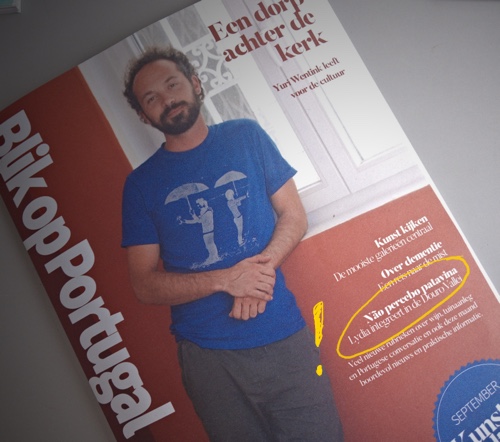We were not very fond of social media when we still lived in the Netherlands. But since we emigrated, I’m a heavy user. Facebook is very popular in Portugal and the primary source of information to know what is happening in the area. On Facebook, I also found nice groups with other DIY enthusiasts, chicken fans, beekeepers, and foreigners trying to find their way (in the bureaucratic maze) in Portugal.
One of those groups is NCA Portugal. They are not only a FB-group but also an official association of Dutch speakers in Portugal. The association publishes a monthly magazine, Blik op Portugal, meaning Focus on Portugal. Containing personal stories, interesting facts, tips, and columns. And you may already guess it, from this month on Dona Rolha writes a monthly column about our integration experiences.
More info: ncaportugal.com (in Dutch only)
Portuguese word list on media
| social media | redes sociais |
| take a look at something | dar uma olhada em algo |
| magazine | revista |
| article | artigo |
| column | crónica |
| subscription | assinatura |
Last column by Dona Rolha in Focus on Portugal, September 2022 (translated):
Não percebo patavina
‘Oh no, that’s the smile of a migrant’ is what I thought when I read an interview with third-generation migrants. In it, young Dutch people spoke with disgust about the humble attitude that their parents or grandparents had adopted. With a weak smile, awaiting, and most of all, no outspoken opinion.
Now that I have been an immigrant for almost five years, I know that this smile has nothing to do with a humble attitude. I regularly have it on my face too. It is the ‘não percebo patavina’ smile, to hide the fact that I ‘don’t understand a damn thing’.
I hate that smile and yet I put it on my face when the Portuguese conversation gets a bit complicated. For example, when we speak to the owner of neighbouring land, who is at odds with the rest of the village. Or when someone from my yoga class tells about a sick relative. Or when we get entangled in a discussion about social premiums in the local restaurant.
In short, conversations in which you want to give a more nuanced or pointed response, but you simply don’t have the words. Every Portuguese person understands that, as a foreigner, you do not fully grasp the language. But they don’t realise that I can’t reveal myself to them fully because of it.
Out of discomfort, I make that stupid, weak smile on my face. And I’m just nodding a little.
My view on the topic of ‘integration’ has changed since I became a migrant myself. The extent to which you integrate depends on yourself, but also on your environment.
The first year we lived in this small village, the neighbours looked at us as if we were aliens. It’s been three years since we started to exchange some fruits and vegetables with them. And only since a year ago, have we been asked to help clean the church path as well. The villagers have been watching us like cats jumping a way. And I can’t agree more with them.
At the same time, we became friends with Portuguese who, like us, come from the city or have seen something of the world. It is easier to communicate with them, especially as we can fall back on English.
But I know they’ll get tired of that silly smile at some point too. That’s why I decide every day: Vou estudar português com mais afinco!

